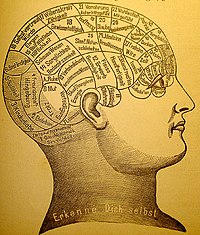
Photo from wikipedia
The importance of digestion and gut health has been recognized since ancient times through ideas coined by Aristotle, the father of modern medicine. The role of gut microbes in digestion,… Click to show full abstract
The importance of digestion and gut health has been recognized since ancient times through ideas coined by Aristotle, the father of modern medicine. The role of gut microbes in digestion, however, was not truly unveiled until the use of germfree animals in the middle of the twentieth century (Reyniers et al., 1946). Introduction of single microbes, or defined assemblages of microbes to germfree hosts, enabled the first detailed studies on how gut microbes can be related to health and disease (Reyniers and Sacksteder, 1958). Early breakthrough discoveries showed that microbes can harvest energy from compounds for which the host lacks the enzymatic machinery needed to degrade them, with microbiota derived short chain fatty acids being an important energy source for many animals (Bergman, 1990). It has also been shown that the gut microbiota can induce their own nutrient production from the host epithelial cells (Bry et al., 1996). Taken together, these early discoveries highlight the mutualistic relation between gut microorganisms and the host. Through the introduction of new culturing and new analytical approaches, in particular second and third generation sequencing, we have made major breakthrough advancements during the twenty-first century in the understanding of the role of microbes in our gut (Rodríguez et al., 2015). The most compelling discoveries perhaps relate to the findings that gut microbes can affect our mood and behavior (Bravo et al., 2011; Naseribafrouei et al., 2014), are an essential component of immunological imprinting during infancy (Olin et al., 2018), and influence non-communicable diseases (Zhao et al., 2018). Although new technologies have enabled deeper and more detailed insight into aspects of host-microbe associations, these associations mainly represent snapshots in time and space. Fundamental knowledge such as generation time of microbes and flux of metabolites across the gut remains largely unknown. We also still lack fundamental knowledge about the ecology of the gut associated bacteria and the interplay with host. Finally, we have limited knowledge related to the mobile genetic elements in the gut microbiota. Determining such parameters will be crucial for mechanistic understanding of microbes in our gut, and ultimately in deriving causal mechanistic models. In this grand challenge description, we will highlight some of these fields where we believe we still have major knowledge gaps that need to be filled in the future.
Journal Title: Frontiers in Microbiology
Year Published: 2021
Link to full text (if available)
Share on Social Media: Sign Up to like & get
recommendations!